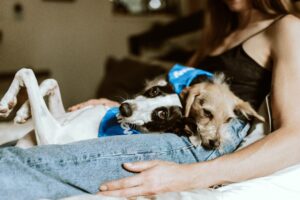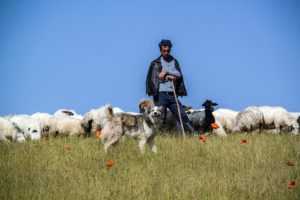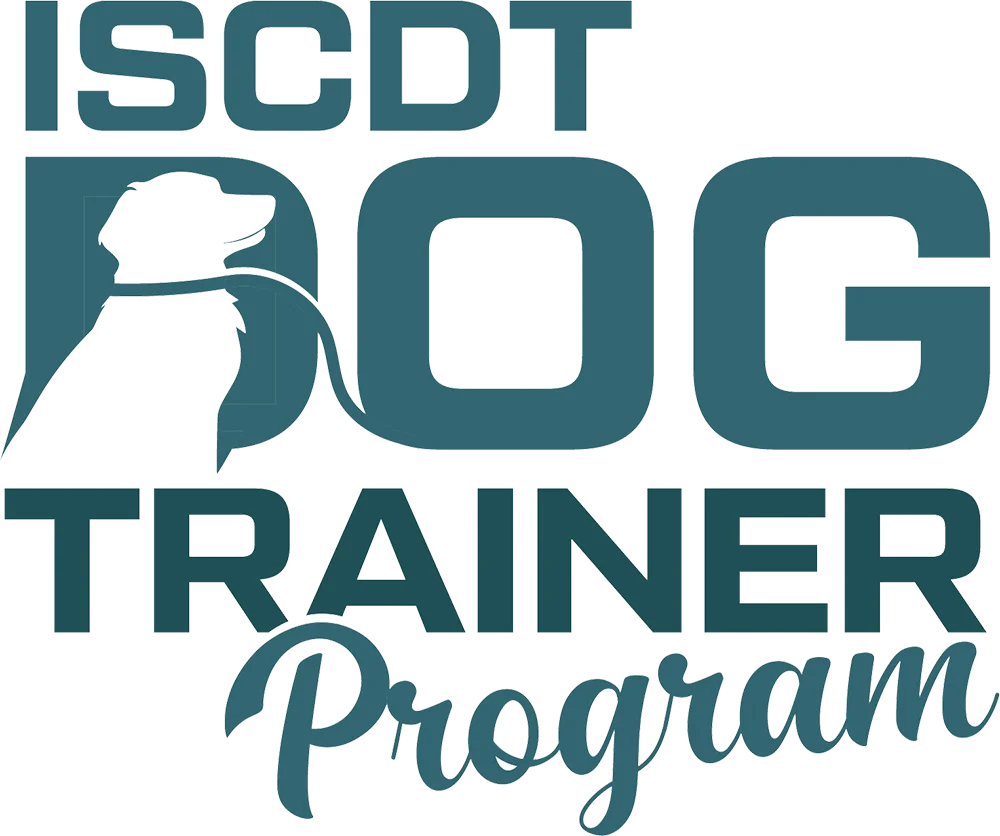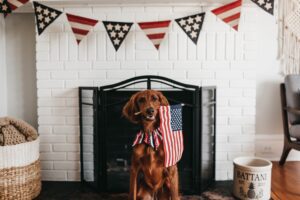The Fourth of July is a dog’s worst holiday. Unlike thunderstorms, where electrostatic charges of the atmosphere and changes in barometric pressure alert a dog to a thunderstorm hours earlier, fireworks do not provide a forewarning. There truly is nothing good about the holiday for dogs.
While we advocate sharing adventures and daily activities with your fur babies, when it comes to certain holidays, such as Fourth of July and Halloween, we feel your dog is safer left out of the festivities.
Stress:
 The upcoming holiday causes a great deal of stress for dogs. This anxiety is not limited to fireworks. There are some dogs who are not bothered by sound. That does not mean other factors will not cause stress for them, such as:
The upcoming holiday causes a great deal of stress for dogs. This anxiety is not limited to fireworks. There are some dogs who are not bothered by sound. That does not mean other factors will not cause stress for them, such as:
- Unfamiliar faces
- repeated ringing of the doorbell
- commotion in the neighborhood
- People going in and out of the house
- loud music
- pushy humans demanding your dog’s affection
- being off schedule
- Kids running around the house
- Getting burned from firework remnants that fall from the sky
Some people feel their dog is well-adjusted and not affected by anything. So, here are signs of stress in dogs. Maybe there is something you didn’t recognize as a sign of stress:
- shaking
- Whining
- Barking
- Panting
- Drooling
- Licking his lips
- refusing treats
- skipping meals
- Avoidance
- Pacing
- Shedding (during the event)
- the appearance of dandruff on their fur
- Agitation
- changes in ear placement
- tightness around the mouth and eyes
- body posture
- tail placement
Stress affects us negatively. While we may not be able to prevent stress for our dog, there are ways to decrease stress levels for dog on Fourth of July.
Please keep in mind, some of these tips require work leading up to Independence day. Waiting until the last minute to enact these tips may work against your efforts to calm your dog.
Exercise
We’ve heard the idiom, “a tired dog is a good dog”. In the case of the Fourth of July, we’re hoping an exercised dog is too tired to get too worked up over fireworks.
Spend the early part of the day enjoying long walks with your dog. Since people tend to shoot off M-80 fireworks during the day and it may be too hot to walk outdoors, walking inside a pet-friendly store may be a better choice. A new setting and all the smells that go along with that location may be extra exciting for the dog, thereby tiring them out more than a neighborhood walk would.
When it comes time for your dog’s meals, ditch the food bowl and feed your dogs with:
- treat releasing balls
- lick mats
- snuffle mats
- Kongs
- marrow bones
Working for food is not only enjoyable for dogs, it also challenges their brain. Please note, these feeding tools should not be limited to one day a year. Your dog will enjoy use of these items on a daily basis.
All walks and outdoor bathroom breaks should happen before sunset. Do not force your dog to go outside during the height of firework displays. You cannot force a dog to eliminate and the stress could result in negative consequences, such as your dog squirming out of their collar or harness and running off. When all the activities die down, you can walk your dog outside before going to bed.
Keep Your Dog Company
 Your presence may reduce some of the stress levels for your dog. If you can, limit your outings to daytime barbecues. Have at least one family member return home before the continuous explosion of fireworks in the evening.
Your presence may reduce some of the stress levels for your dog. If you can, limit your outings to daytime barbecues. Have at least one family member return home before the continuous explosion of fireworks in the evening.
If that is not possible or if the celebration is at your house, board your dog. Most facilities fill up long before Independence Day, so start calling around now. You may be lucky and find there’s been a cancellation.
For dogs who will remain in their home on the Fourth:
- Make sure your dog wears a collar and identification tags all day and night
- Register your microchip if you haven’t already
- Prepare a safe place for your dog to rest (or hide) when they feel stressed.
- Keep the shades/curtains closed
- Use a sound machine or keep the television/radio loud to drown out the outdoor sound of both people and fireworks.
- Give your dog space. Do not try to comfort a frightened dog who is on their bed or hidden away. Forcing an interaction could lead to a dog bite.
- Keep children and guests away from your dog. This is not the time for dogs to meet new people. We should never force interaction.
- Secure windows and doors to your home to prevent the dog from escaping.
- If your dog is locked in a crate or a room, either close the door or gate off the area to prevent people from sneaking in to visit the dog. For extra safeguarding, place a “do not disturb” sign on the room where your dog is staying.
Calming Tools
Anxiety wraps, such as Thundershirts, can be helpful for dogs who suffer with anxiety. The constant pressure on your dog’s chest feels much like a swaddled baby. While anti-anxiety wraps do not work for every dog, there are many who benefit from it.
To increase the likelihood of success, you should not wait until Fourth of July or the first thunderstorm to use it. Instead, introduce the product during non-stressful periods, such as when you and your dog are cuddling at night on the couch.
You can feed your dog dinner or offer high-quality treats while they wear the anti-anxiety wrap, or participate in an another activity your dog greatly enjoys. These exercises create a positive association to the product. Click here to read additional tips for working with an anxiety wrap.
Your vet may suggest medication for dogs who experience stress during storms, during large gatherings or those who suffer from sound anxiety. Take their advice and use medication if it helps your dog get through the day (or in this case, the weekend). Avoid searching online for over-the-counter medications as they may not be well-suited for your dog. Instead, speak to a holistic practitioner to determine the best products and proper dosage.
Desensitizing
Desensitize your dog to the sound of thunder or fireworks. Please note, it can take weeks, months or even years to desensitize your dog to these scary sounds. It is always best to work with a professional dog trainer. Anxiety affects each person and dog differently, therefore the amount of time it takes to overcome anxiety cannot be determined. We can confidently tell you, it will not be resolved overnight, or even over a week. Here is how you can desensitize your dog to the sound of fireworks or thunder.
- Play the sound at a low volume from another room. Your dog must be calm and relaxed for this to work. If the sound causes stress, either lower the volume or move the sound device further away.
- Use a high value food reward. Be sure your dog considers the reward high value, rather than relying on the sales pitch of food companies or even advice of your best friend. I have worked with dogs that are only motivated by a Milk Bone or dry dog kibble. Meantime we were experimenting with freeze-dried food, steak and cheese.
- If your dog is not affected by the sound, you can slightly increase the volume. Ensure your dog is still relaxed, happy and enjoying the treats.
- You will continue to raise the volume and/or decrease the distance between your dog and the device playing the sound. This could happen over several hours, days, weeks or months. If you move too fast and your dog feels stress (stops eating, shows signs of stress or runs off to hide) you will negatively affect your end result.
- Patience is key. Hiring a dog trainer will enhance your training efforts. Contact ISCDT to see if we have a certified dog trainer in your area.
Unfortunate circumstances of sharing the day with your dog.
- The constant traffic of people in and out of your house and yard provide the perfect escape route for your dog. A high percentage of dogs go missing on Fourth of July.
- Alcoholic drinks and plates of food left on the ground or on low surfaces by party guest provide easy access for dogs. A thirsty or hungry dog may consume those items and end up with gastrointestinal upset.
- The compassionate guest who wants to soothe your dog can end up with a dog bite. Even friendly, well-socialized dogs can bite when they are frightened, hurt or feeling unwell.
One final Fourth of July tip, when walking your dog after the festivities or early the next morning, be sure to avoid messes left over from firework displays and party guests. Alcohol, charcoal, marijuana and other items left in yards and on the street can cause serious health issues for your dog.
We hope these tips help your dog get through July 4. Join us next week for barbecue safety tips.
Photo 1 credit: Camylla Battani/unsplash
Photo 2 credit: Chewy/unsplash
Photo 3 credit: POOYAN-ESHTIAGHI/unsplash
ISCDT’s online program consists of 18 hands-on lessons, where students are required to work with dogs. Skill and ability is determined through a series of videos submitted to your personal ISCDT mentor. Students are also responsible for written homework assignments. In addition to the online program, we also offer one-and-two-week in-person internships. To learn more about the courses we offer, visit ISCDT.com


